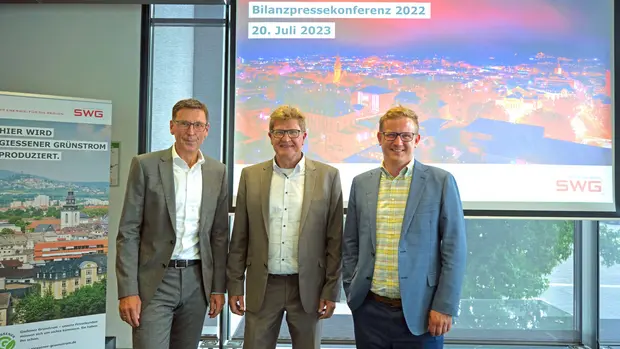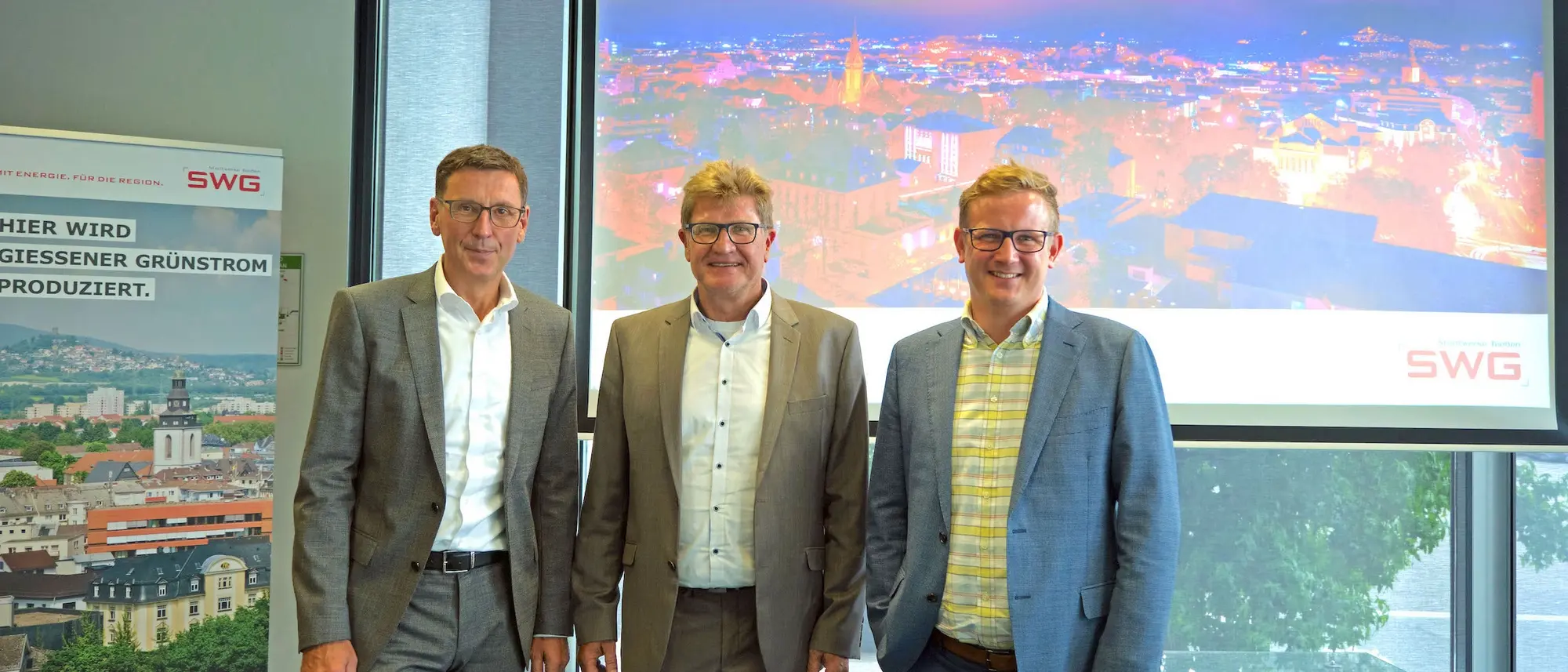
Stadtwerke Gießen presented its balance sheet for 2022 yesterday. At the press conference, Supervisory Board Chairman Alexander Wright and the two SWG Management Board members took a closer look at the company's results and discussed them against the backdrop of the current situation.
Stadtwerke Gießen (SWG) has weathered the crisis well for the third year in a row. In fact, the company managed to generate a profit of around 8.4 million euros, exceeding the previous year's result by around 2.9 million euros. At the annual press conference, however, SWG board members Matthias Funk and Jens Schmidt put this positive development into perspective. "The profit from our business activities is roughly at the level of 2021, i.e. around 5.5 million euros. The increase in earnings is the result of a one-off effect," explains Jens Schmidt, Commercial Director of SWG. In fact, SWG has released parts of a provision for a legal dispute, which it has since won, to the income statement.
Thanks to these figures, SWG will once again be able to distribute 2.5 million euros as a dividend to its owner, the city of Giessen, this year. The remaining approximately 6 million euros will be allocated to reserves. This means that SWG's equity ratio is now 35.7 per cent. "Stadtwerke is and will remain a rock-solid company that is ideally positioned for the complex tasks ahead," emphasises Alexander Wright. He took over as Chairman of the Supervisory Board from Astrid Eibelshäuser in July 2022.
Jens Schmidt confirmed this assessment, as only an economically sound company will be able to meet the complex challenges of the future, such as the expansion of electricity and heating grids in particular as part of the energy transition. He cited a key reason for the pleasing figures: "The fact that we were able to maintain the result from our actual business activities despite the many massive challenges last year makes us a little proud. After all, this great success is based on the consistent, sometimes hard work that our dedicated team puts in every day. We would like to take this opportunity to thank all our employees. For their tireless commitment and for the fact that we can always rely on them and their in-depth expertise."
The challenge of a gas shortage
As in the industry as a whole, the past financial year was of course also characterised by the impending gas shortage at SWG, which had an impact on numerous different areas. For example, many customers whose suppliers let them down due to the massive increase in natural gas prices - and subsequently also in electricity prices - found a reliable partner in SWG. "Once again, we have proven to be a safe harbour," Jens Schmidt sums up.
It goes without saying that SWG meticulously scrutinised all areas of the company to identify and exploit its own savings potential - not just for natural gas, but for energy in general. "We have done everything we can to make our contribution," Matthias Funk continues. Last but not least, we succeeded in explaining to numerous customers how they can noticeably reduce their energy consumption without having to make sacrifices. This is demonstrated by the rising number of participants in the "Energy Knowledge on Tuesday" series of talks. In fact, more and more people are taking advantage of the opportunity to find out more about saving energy. "The change of format to online lectures has proved successful. Not only are they more convenient, but our colleagues from the energy advice centre can make their extensive knowledge available to many more people at the same time," adds Matthias Funk.
However, the problem of gas shortages is not yet over. Although the sources of supply have been diversified and the storage facilities are already very well filled, the alert level still applies in Germany. This is because nobody can estimate how cold the next winter will be and how long it will last. The Federal Network Agency has run through various scenarios. The associated calculations show that natural gas could become scarce under certain conditions. "We are monitoring developments just as closely as before. This ensures that we can always react in good time should the supply situation change dramatically," says Matthias Funk, categorising the situation.
In the meantime, the market has calmed down again. SWG naturally takes this fact into account. "When the positive trend on the stock market stabilised, we acted immediately, recalculated and lowered our prices for natural gas and electricity," explains Jens Schmidt.
Still on track
Regardless of the crisis and its effects, SWG continued to expand its business areas last year. One focus was on photovoltaics. In December 2022, the city of Giessen and SWG founded the company MIT.GIESSEN GmbH. Both partners each hold 50 per cent of the shares in the company, whose business purpose is to develop energy services that will play their part in implementing the climate policy goals in Giessen. To this end, MIT.GIESSEN will initially drive forward the expansion of photovoltaic systems on the roofs of municipal properties. Both shareholders have entrusted one person from their ranks with the management of the company, which ensures co-operation on an equal footing.
In addition, SWG naturally also pursued its own goals in terms of photovoltaics. For example, a system with a peak output of 99.9 kilowatts went into operation in October 2022. It is located on the roof of a warehouse on the factory premises in Lahnstraße. SWG has also successfully established the topic of tenant electricity on the market: 15 plants are already in operation or under construction, and orders have been placed for a further two plants. "We're talking about a total of around 860 kilowatts of peak output," Matthias Funk explains. He adds: "With our tenant electricity, we are closing an equity gap. Until now, the benefits of solar power have been reserved for those who own a property. We are now changing that. Not overnight, but consistently and step by step." Tenant electricity means that the residents of a building consume the electricity produced directly and pay at least ten per cent less than electricity costs at the basic supply tariff. Of course, SWG takes care of the exact billing with the tenants and the supply of green electricity when the sun is not shining.
SWG has been particularly successful with its E-Revolution. In this product world, the primary aim is to help e-mobility achieve a breakthrough. Last year, however, SWG primarily recorded incoming orders for PV systems, which are an important component of the modular complete package. "The development was foreseeable. But the fact that our offer has been so well received has exceeded our expectations," says Jens Schmidt, pleased with the high demand.
Scoring points in other sectors too
Although natural gas is set to play an increasingly minor role, it will remain an indispensable source of energy in the coming years - in Giessen too. For this reason, the city's authorities have decided to extend the concession agreement with SWG for a further 20 years. "We are very grateful to SWG for giving us the necessary options to phase out natural gas earlier," explains Alexander Wright. This will allow the city to continue to consistently pursue its goal of becomingCO2-neutral by 2035. Municipal heat planning, which will become mandatory this year, is becoming increasingly important, especially against this backdrop. "We are already very well positioned here with SWG and its existing close-knit district heating network," the Chairman of the Supervisory Board is certain.
SWG can also report a success in the water sector. In 2022, the town of Allendorf/Lumda awarded the management of its drinking water network to SWG. "We were able to convince those responsible in the municipality of our many years of expertise in this area," Matthias Funk recalls of the negotiations, which ended with the town of Allendorf/Lumda entrusting SWG with this important public service task.
Last but not least, the SWG subsidiary MIT.BUS optimised local transport in the town centre. Thanks to six new buses with mild hybrid technology, MIT.BUS was once again able to significantly reduce the already low pollutant emissions of its fleet. However, the vehicles have no influence onCO2 emissions. This can hardly be reduced any further. Since March 2019, MIT.BUS has only been using gas-powered buses that run on biomethane and are therefore practicallyCO2-neutral. Regardless of the environmental benefits, the new vehicles - like the rest of the fleet - score points with another feature: they offer free Wi-Fi for all passengers. "The access figures show that the decision to offer this additional service was exactly right and that we have been able to make local transport even more attractive," explains Jens Schmidt.

